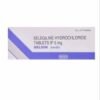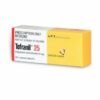What is thyroid desiccated?
thyroid desiccated
Get Now
The use of desiccated thyroid dates back to the early 20th century when it was the first effective treatment for hypothyroidism. Before the advent of synthetic hormones, physicians relied on animal glands to provide the necessary hormones for patients. The introduction of synthetic levothyroxine (T4) in the mid-20th century became the standard treatment, but desiccated thyroid has seen a resurgence in interest due to the desire for more natural therapies.
Composition and Function
Thyroid desiccate contains a combination of the two primary thyroid hormones: thyroxine (T4) and triiodothyronine (T3). The ratio of these hormones can vary depending on the specific preparation, but typically, it contains about 80% T4 and 20% T3. This unique combination mimics the body’s natural hormone production more closely than synthetic T4 alone.
Desiccate thyroid is available in tablet form and is usually take once daily. The dosage must be individualize base on the patient’s needs, as factors like age, weight, and the severity of hypothyroidism can influence the required amount.
Benefits of Thyroid Desiccated
- Natural Source: Many patients prefer desiccate thyroid because it is derive from animal sources and is seen as a more “natural” option compare to synthetic alternatives.
- Comprehensive Hormone Profile: DTE provides both T4 and T3. Which can be beneficial for individuals who do not convert T4 to T3 effectively.
- Symptom Relief: Some patients report improve symptom relief and overall well-being when using desiccate thyroid compared to synthetic T4. Common symptoms of hypothyroidism include fatigue, weight gain, depression, and cold intolerance.
- Personalized Treatment: The ability to adjust doses based on individual response can lead to more tailor treatment plans.
Potential Drawbacks
- Variability in Dosage: Unlike synthetic hormones that provide a precise dosage. The hormone content in desiccate thyroid can vary between batches. This inconsistency may lead to fluctuations in hormone levels.
- Side Effects: Some patients may experience side effects such as heart palpitations, anxiety, weight loss, or insomnia if the dosage is too high, particularly due to the presence of T3, which can act more quickly and potently than T4.
- Allergic Reactions: Since it is derive from animal sources. There is a potential for allergic reactions in some individuals.
- Limited Research: While there is anecdotal evidence supporting its use. there is less robust clinical research on desiccated thyroid compared to synthetic options. This can make some healthcare providers hesitant to prescribe it.
Considerations for Patients
- Consultation with Healthcare Provider: Before starting any thyroid medication, including desiccated thyroid. it’s crucial to consult with a healthcare provider. They can provide guidance on the appropriateness of this treatment based on individual health profiles and thyroid function tests.
- Regular Monitoring: Patients on desiccated thyroid should have their thyroid hormone levels monitored regularly to ensure the dosage remains effective and safe.
- Personal Experience: Each patient’s response can vary significantly. It may take time to find the right dosage and formulation.
- Lifestyle Factors: Diet, exercise, and overall lifestyle can impact thyroid health and hormone levels. Making it essential to adopt a holistic approach to managing hypothyroidism.
Conclusion
Thyroid desiccated can be a valuable treatment option for those with hypothyroidism, especially for individuals seeking a more natural approach to hormone replacement.



